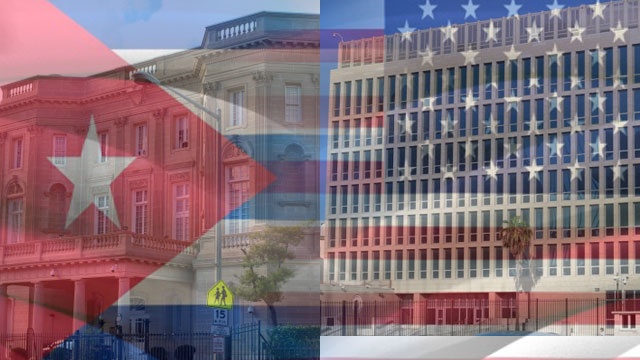
Opening of the embassies and the historical legacy
The opening of embassies in Havana and Washington demonstrate that the movement towards a normal relationship between the two countries continues unabated, regardless of the ever-diminishing shrills from those who oppose any level of engagement.
The latest announcement, met with overwhelming domestic and international approval, formalizes the restoration of diplomatic relations between Cuba and the United States, ending more than 50 years of political antagonism. The historic background to that break goes back to the months before the Bay of Pigs invasion in April 1961, when the American side closed down their embassy in Havana as a result of the deteriorating relationship with the Cuban Revolutionary government. The closure led to America’s decades-long effort to destroy the revolution, aspects which continue today in the form of the economic embargo and travel restrictions for US citizens.
Now, however, with President Obama’s determination to end America’s isolation of Cuba, supported by Cuban President Raul Castro, another brick in the wall has been taken down between these two neighbors who have had such a complicated, troubled past.
Unfortunately, others seem just as determined to prop up the crumbling edifice, most notably from far-right Cuban-American congressmen. Republican Senator and presidential candidate Ted Cruz claimed that Obama had somehow ‘unconditionally surrendered’ to the Castros by announcing the opening of the embassy. Ileana Ros-Lehtinen, R-Florida, one of the harshest critics of the President’s Cuban policy, reacted immediately by stating that opening an embassy in Cuba “will do nothing to help the Cuban people and is just another trivial attempt for President Obama to go legacy shopping.”
Ros-Lehtinen represents the ever diminishing circle of those who are desperately trying to block the process that began back in December. She and others are hoping to push through legislation in Congress that would prohibit expansion of private companies offering travel to Cuba for American citizens, as well as refusing to approve the funding necessary for the embassy. Expectations are that Obama would veto these measures if they ever made it to his desk.
Even those supporting Obama’s new policy often spout standard anti-Cuban rhetoric, mostly based on the demands that Cuba conform to multi-style political party structures and respect for civil rights. The Cubans justifiably retort they are happy to debate those issues, as long as what they consider the flaws in American political/social life are discussed as well. And while the Havana government welcomes the normalization process, they harbour deep concerns that the shift represents a new strategy in America’s long held policy of regime change, pointing as evidence to the continued funding for ‘pro-democratic’ reforms that have been approved this year.
The embassy openings, however, will add greater authority for the Cuban government to challenge such programs, as well as giving both sides the opportunity to resolve the many other issues still outstanding at a higher diplomatic level.
The announcement is the first major result in the negotiations between Havana and Washington, made possible when the United States last month removed Cuba from the states that sponsor terrorism. It is a positive, logical step in the long process. The next stage is the ending of the embargo and removing all travel restrictions for Americans who want to see Cuba first hand. Those conditions will take longer to eliminate, as they are enshrined in law under the control of Congress. The upgrade from interest sections to embassies do, however, make the possibility of changing that legislation closer to reality. Simply from a politically practical viewpoint, it is impossible to suggest that full relations have been established while one side continues to justify an illegal embargo and unconstitutional travel restrictions.
Ros-Lehtinen may be right when she comments that Obama’s Cuban strategy is part of his legacy. As such, it is a legacy of common sense, of putting aside the past in order to move to the future, and it is a legacy that will benefit the people of both sides of the Florida straits. As opposed to Ros-Lehtinen’s increasingly stagnant legacy; that of intransigence, duplicity and a cynical attempt to hold on to her political influence by pandering to those who lament seeing history pass them by. And it will be history that decides who was on the right side of the legacy ledger.
Keith Bolender is a freelance journalist author of Cuba Under Siege (Palgrave 2012); and Voices From the Other Side; An Oral History of Terrorism Against Cuba (Pluto Press 2010).

